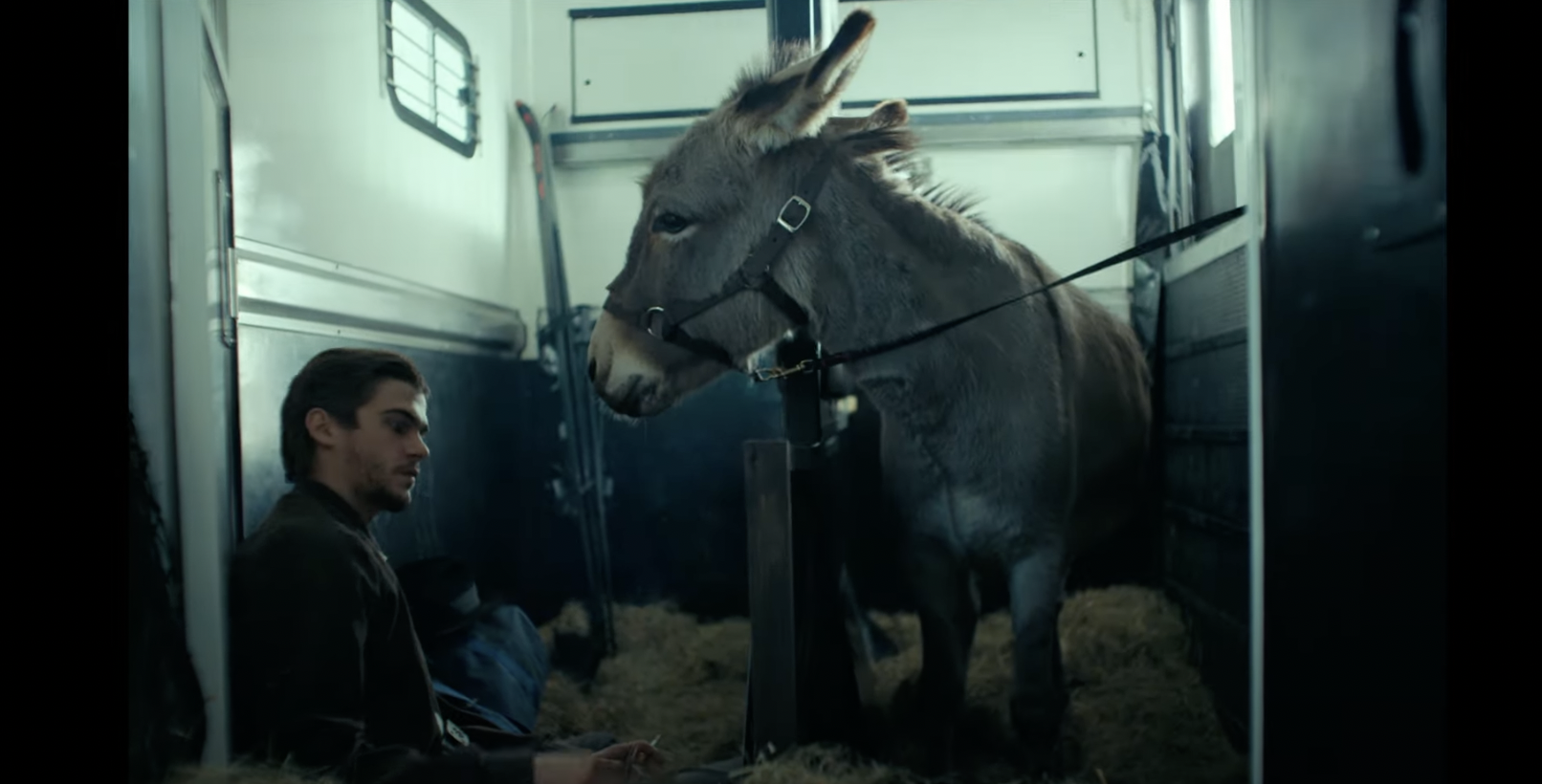I’m going to spoil the ending of EO for you: The donkey dies.

Picture sitting in a theater. We, the audience, have spent the last hour and a half following Eo (the titular donkey) as he wanders in and out of the lives of a dozen humans – some heartlessly malicious, some terribly kind. Every act of cruelty, or grace, is balanced by its opposite. A beating by a group of football hooligans is followed by a veterinarian choosing to help Eo recover rather than euthanize him. Strangers who find him take him in, then use him as a beast of burden for a job slaughtering minks at a fur farm. And then, in the last five minutes, Eo wanders into a herd of cattle, who are in turn herded into a pen… then up a winding, gradually narrowing path… and we realize with horror Eo is walking straight into a slaughterhouse.
There’s a moment when we think another act of grace is coming, as a slaughterhouse worker spots the out-of-place donkey among the sea of cows. But rather than pull Eo aside, she gives his hindquarters a halfhearted swat to keep him moving along the path.
You don’t see him die, but you hear the loud thud of the killing blow as the screen cuts to black.
And gang, I have to tell you: I was not ready for that shit. The pandemic’s left me out of practice with going to theaters – I didn’t even think to check Does The Dog Die?, which doesn’t just tell you if the dog dies but if any animal gets killed – and, more than that, out of practice with sad endings.
My 2020 story is a lot of the same old song everybody’s sung. You know how it goes. My world shrunk to the size of a small house with a small backyard; a computer monitor filled with tiny boxes of my friends' faces; a trail I walked every day, where I was too scared to smell the lilacs because it’d mean taking my mask off for ten seconds. I desperately wanted to make it larger, but finding an escape that didn’t yank me violently back to the present proved difficult, when what I really wanted was to live out a fantasy of no surprises and few uncertainties. That meant a whole lot of gentle, low-stakes, silly media, so for a minute or two, I could pretend the world wasn’t dying outside. (Which only lasted as long as it took to check Twitter and fall into another doomscroll of covid fatalities, of Trump and the upcoming election, of George Floyd, of – )
When I shed that cushion of softness, I got used to the feel of a mask on my face, staying six feet away from all my coworkers, and outdoor visits with my mom in a church parking lot. I got used to holding my breath when I hugged her – which ended up being her big Mother’s Day present that year. Just a hug from one of her kids after two months without physical contact. We both cried.
But as the pandemic dragged on, that unbearable weight started to feel almost ordinary. And nowadays? I can lift things that would have crushed me before. No anxiety can touch will my elderly mom die if I give her a hug? and no depression will ever sink to the nadir of months and months with only my cat for consistent, non-virtual company. Yeah, sometimes my lizard brain still scampers out of control – that’s the nature of clinical depression/anxiety – but I feel worlds tougher and more capable after getting fired in the kiln of the last three years.
Except when a donkey dies on the big screen. Then: here I am, in tears, easily cracked if I’m struck the wrong way by the wrong story.
I still want that soft predictability, no matter how much resilience I’ve gained. I guess after three years of keeping my guard up around death and despair, I need those little moments of escape more than ever: places where I can fully let down my guard and let a gentle fiction wash away reality. Every hurt will be healed. Every cruelty will be met with grace. Every community will come together and stay together, a shield to protect its most vulnerable. Every donkey will escape death, once more, and wander free into the world.